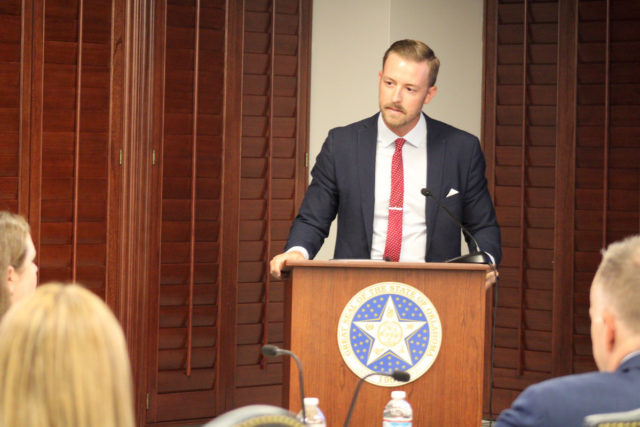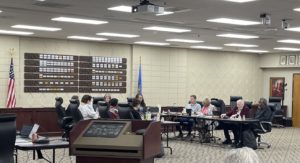
The Oklahoma State Board of Education voted 4-2 today to lower the accreditation status of Tulsa Public Schools to “accredited with warning” owing to a teacher’s complaint that a third-party vendor’s training violated new State Department of Education rules that prohibit certain instruction about race and gender. The board also voted 4-2 to lower Mustang Public Schools’ accreditation to “accredited with warning” owing to a student exercise about how people have “different experiences in life.”
Thursday’s five-hour meeting grew tense, with fiery public comment from Secretary of Education Ryan Walters regarding two sexually explicit graphic novels found in the TPS library catalogue and blunt comments from board member Carlisha Williams Bradley, who questioned OSDE general counsel Brad Clark’s judgment on racial concerns as “a white man.”
Williams Bradley and Superintendent of Public Instruction Joy Hofmeister were the two board members who voted against the motions to downgrade Tulsa Public Schools’ and Mustang Public Schools’ accreditation statuses to “accredited with warning,” a more extreme step than the recommendation from Clark, who suggested classifying the districts as “accredited with deficiency.”
“Tulsa is the largest district in our state and it is also filled of predominantly students of color,” Williams Bradley said after board members approved the TPS motion. “As we talk about HB 1775 (which mandated the new rules on discussing racism), it is infuriating to sit in this seat and witness what just happened. I have to be on the record stating that it’s not OK.”
Hofmeister and Williams Bradley referenced the permanent administrative rules stemming from HB 1775 that were approved by the State Board of Education at a meeting in March. The rules state that a school failing to comply with the prohibition of teaching students or training staff that one group or race is superior to another will “at a minimum, result in the accreditation status of the public school being classified as ‘accredited with deficiency,'” with one year to correct deficiencies.
The rules say districts that fail to make corrections will subsequently be classified as “accredited with probation,” one step beyond the “accredited with warning” designation approved by the board Thursday.
“We’ve seen this district, not only with 1775 but in other ways, violate the opportunity for these students to get exceptional, quality education, and there’s evidence of that,” said board member Estela Hernandez. “Accredited with warning is sufficient in this case because we need to send a message that the deliberate breaking of the law needs to be on probation. But, at this point, I can definitely stand with a warning in making sure that this doesn’t happen again.”
Board member Trent Smith was absent from Thursday’s meeting.
‘This is a law that has a lot of vagueness’
Tulsa Public Schools’ accreditation came into question after a teacher in the district submitted a complaint to OSDE regarding HB 1775, which banned the teaching of certain concepts about race and gender in Oklahoma public schools.
The complaint, which was obtained by Public Radio Tulsa, stated the teacher was forced to take a professional development training course that included statements the staff member said “shame white people for past offenses.” The training took place in August 2021 and was supplied through a third-party vendor.
Hofmeister called the board’s decision to downgrade Tulsa Schools’ accreditation to “accredited with warning” rather than “accredited with deficiency” emotional.
“No matter what anyone in this room feels about the law, we have a law. The law also has rules established with that and we know that this is a law that has a lot of vagueness,” Hofmeister said. “There is before you a recommendation that does comply with the current rules regarding a vendor, and that is a deficiency. It is, in my opinion, an escalation that feels rather emotional.”
RELATED
After chaotic Monday meeting, Tulsa Public Schools Board overcomes consent-agenda deadlock by Andrea Hancock
Walters, who is campaigning to succeed Hofmeister as state superintendent, urged board members to take action on Tulsa Schools during the public comment portion of the day’s meeting.
“Superintendent Hofmeister, you have failed our kids. You have allowed pornography to enter into our schools. You have allowed critical race theory to enter into our schools,” Walters said. “Now I’m asking for you to hold this school accountable. I’m asking, I’m demanding, that this board do something about the accreditation of Tulsa Public Schools. I’m also demanding that this board do a review of Superintendent (Deborah) Gist’s superintendent certification. We can not allow district leaders to push indoctrination and pornography on our kids.”
During the meeting, Clark called the violation a “close call” and said that, throughout the OSDE investigation, he and the review team had the opportunity to look at the complaint, TPS’ response, the slide show that went along with the training and an audio recording form the training.
Williams Bradley said her “No” vote also stemmed from a lack of evidence of a HB 1775 violation, noting that she has not had the opportunity to review the audio from the training herself
“[Clark] had to make an inference based on the audio that never explicitly said that an individual by virtue of his race or her race or sex is inherently racist, sexist or oppressive. None of these things were ever said,” Williams Bradley said. “He had to make an inference as a white man what was meant by this training.”
Williams Bradley also took issue with people confusing implicit bias and inherent racism.
“Implicit bias is something that we all have. The teacher who complained stated this was specifically speaking to white people, but in this training what I see is it also explicitly states that we all, as individuals, have implicit bias,” Williams Bradley said. “It’s not inherent by nature, but it is based upon our lived experiences. This is explaining in that training the same concepts of things that we experience through our lives that can impact how we show up in the classroom.”
Bradley also questioned why board member Brian Bobek proposed a motion to drop Tulsa Public Schools’ accreditation status to “accredited with warning” rather than “accredited with deficiency.” Accredited with deficiency refers to a site failing to meet one or more of the standards, but does not seriously detract from the quality of the school’s education program. Accredited with warning means a deficiency seriously detracts from the quality of the school’s educational program.
“In my opinion, it violates it because whoever took [the training] is going to be biased, potentially,” Bobek said. “In my opinion, I respect yours, but my opinion is warning is warranted.”
Williams Bradley responded to Bobek by saying bias does not equate to inherent racism. She suggested that a lack of shared understanding of these definitions is a reason to teach the content in schools.
After the meeting, Mustang Public Schools Superintendent Charles Bradley released a statement saying he was “shocked to learn of this action.”
“Looking at the agenda item as posted by the state board, I do not know how a reasonable person could discern that this was coming,” Bradley said. “We were as surprised as anyone to hear our name mentioned today. After watching the replace of the state board meeting it appears that at least one of the board members, including one who made the motion to increase the penalty, was seemingly unaware that we were included on the agenda.”
‘Sometimes there are trash laws’

Some of the statements made during the public comment portion of Thursday’s meeting urged the State Board of Education to take action against Tulsa Schools in an effort to send a message to school administrators around the state. Maria Seidler told board members she represents the nonprofit law firm start up called Legal Overwatch for Parents Rights in Education and said “progressive TPS employees play a game with HB 1775” with a “catch me if you can” attitude.
“I’m interested, as most of us are, in the social constructs of our country, and it is worrisome to see such a contempt for law in our society today,” Seidler said. “We look at the escalating crime under progressive [district attorneys] who believe they have the power to refuse to follow the law with which they disagree. Unfortunately, this same attitude prevails among many of our public school administrations in deciding which laws to follow and which to ignore. It doesn’t matter what you think about the law. The law is the law, and you have to follow it.”
Rep. Regina Goodwin (D-Tulsa) also spoke during public comment and said evidence of HB 1775 being broken needs to be brought to the table publicly. She also said the law was not written for all children.
“Sometimes there are trash laws. Sometimes there are bad laws that should never be enforced. There used to be a time when Black folks couldn’t vote. That was a law,” said Goodwin, who voted against HB 1775 in the Oklahoma House. “What’s before you today is a teacher who made a complaint that, quite frankly, folks know is a very controversial teacher who has an agenda who has talked about liberals, who has talked about indoctrination, who has talked about prayer rooms and things like that.”
Oklahoma American Civil Liberties Union President Tamya Cox-Touré released a statement following the state board’s decisions.
“Everyone deserves to learn an inclusive and complete history in school, free from censorship or discrimination, but, with the passing of HB 1775, Oklahoma politicians endorsed classroom censorship,” Cox-Touré said. “What we are seeing now are the real-life consequences of the approved promulgating rules by the Oklahoma Department of Education and the clear issues with the broad and vague language of the law itself. Make no mistake: Tulsa Public Schools is just the beginning. The longer HB 1775 is allowed to be in effect, the more accusations we will see across all state public schools.”
Nine districts placed on probation
Later in Thursday’s the meeting, board members also voted to place nine school districts under “accreditation with probation,” the last step before complete accreditation loss:
- Epic Charter School
- Ninnekah Public Schools
- Western Heights Public Schools
- Sovereign Community School
- Hardesty Public Schools
- Moseley Public Schools
- Moyers Public School
- Straight Public Schools
- Barnum Public Schools
Deficiencies found throughout the school districts include health and safety concerns, child nutrition programs and not submitting mandated reports in a timely manner.
“Probation really, in my mind, is an opportunity and a belief,” Clark said. “It’s an opportunity to recognize the deficiencies that we see and recommend, and also a belief that those can be corrected with the right steps, resources, conversation and so forth.”
Epic Charter School board Vice President Ginger Casper released a statement following the meeting.
“We respect the decision and in the coming months, Epic’s Board of Education and its executive leadership team will work hand-in-hand with the Oklahoma State Department of Education to establish a corrective action plan that is meaningful, measurable, accountable and sustainable,” Casper said. “We are confident that Epic has already proactively addressed the majority of the OSDE’s concerns and the most difficult transformations are complete. We look forward to providing immediate results to the OSDE and count on their partnership in showcasing our progress.”
Infinity Generation Preparatory School, a private school that opened its doors in 2018 and was accredited by the OSDE in 2021, was also initially on the list of school districts that faced having their accreditation placed on probation owing to inaccurate enrollment and financial reporting. However, board members voted to place the district under “accreditation with warning.”






















